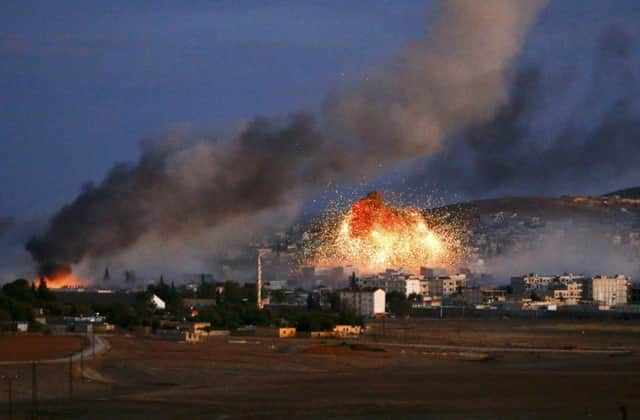US parachutes weapons and medicine into Kobani


It followed an announcement by Turkey’s top diplomat that his country is helping Iraqi Kurdish fighters enter Syria to support fellow Kurds defending the besieged border town from Islamic State extremists.
The air-drops followed weeks of US and coalition airstrikes in and near Kobani, along the Syrian-Turkish border.
Advertisement
Hide AdAdvertisement
Hide AdIt was thought that the move would almost certainly anger the Turkish government, which has said it would oppose any US arms transfers to the Kurdish rebels in Syria.
Turkey views the main Kurdish group in Syria as an extension of the PKK, which has waged a 30-year insurgency in Turkey and is designated a terror group by the US and by Nato.
But the US military’s announcement of the air-drops, coupled with Turkish foreign minister Mevlut Cavusoglu’s comments, is an unexpected development.
It suggests Turkey may be softening its stance. But although a significant departure from previous positions, it is not a complete change of policy – since allowing Iraqi Kurdish peshmerga forces to cross into Syria is different from allowing Turkish PKK forces into Kobani.
It was not immediately clear where and how Turkey was allowing Kurdish fighters into Syria, after blocking them for so long – or whether this had already happened or was still to take place.
Mr Cavusoglu said: “We are helping peshmerga forces to enter into Kobani to give support.”
In Iraq, the Kurdish government in the country’s north confirmed the weapons deliveries and expressed gratitude to Washington.
“Weapons and military aid were delivered to Kobani today from the Kurdistan region of Iraq by American cargo jets,” a statement said.
Advertisement
Hide AdAdvertisement
Hide AdUS president Barack Obama called Turkish president Recep Tayyip Erdogan on Saturday to discuss the situation in Syria and notify him of the air-drop plan.
Turkey has not allowed the US and its allies to use its airspace or air bases to strike inside Syria. The C-130s, which would have taken off from the largely autonomous Kurdish regions of northern Iraq, would have had to fly for some time over Syria.
President Bashar Assad’s forces have made no attempt to challenge coalition aircraft.
US officials say they informed Damascus before launching the first US air strike on IS targets in Syria on 23 September. State department deputy spokeswoman Marie Harf would not comment last week on whether they were ongoing discussions with Syria over the air strikes.
The US said earlier on Sunday that it had launched 11 air strikes overnight in the Kobani area. Activists said the US-led coalition launched five new air strikes shortly before the overnight air-drops.
According to the Britain-based Syrian Observatory for Human Rights, a “large amount of weapons and ammunition” has reached the main Kurdish militia in Kobani.
Kurdish fighters have been picking up and moving the weapons since they were dropped at around dawn, said the observatory.